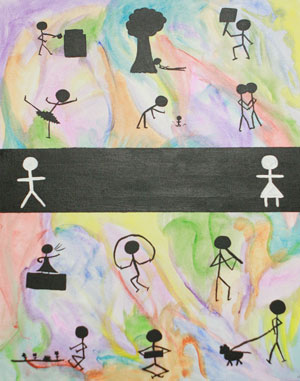Trans Story

Stick Life, by Laura Adelman
I came here to tell you a story about being a trans person.
I have a hundred stories to tell you.
I have stories about the looks of revulsion, anger, shock and naked confusion I get when I use a public washroom.
About the men on the bus who undress me with their eyes, like my identity is a puzzle they have a frantic need to put together. Looks that evaluate me, compare me and change me around, like a paper doll with a million fold on outfits and identities.
I could tell you about the sick, gut-wrenching fear of coming out to my parents, people who don’t understand anything about gender and have no desire to. I could tell you about the twisted coil that took root the first time I was told that I’m ‘loved’ in spite of who I am, not because of it.
I could tell you about the back pain from binding my chest, the raw places on my skin from when it’s too tight. I could tell you about packing, and all the other lurid body-tricks that make me sound like a suffering liar and an illusionist.
Maybe you’d like to hear about the yellow Tonka truck I had a child, the one that I loved while I spurned Barbie dolls and all things feminine. That would be a lie, actually.
Or I could charm you with the classic recitation of how I’ve found myself now, how years of misery and confusion have cumulated in loving myself as a boy, how the cliché of knowing yourself truly has mean that it’s all gonna be okay.
None of these stories are false. Well, except the one about not loving Barbie. But they don’t actually tell you anything about me, or how I experience being trans. They’re about other people. About living in a world not made for people like me. They’re about coping with people’s ignorance, about making my life a teachable moment for others, about negotiating how people read me when it’s far beyond my control. These stories fulfill expectations. They make a movie montage, creating a cohesive narrative that an outsider can take in comfortably through bites of popcorn. Distrust, persecution, affirmation, inevitability: all themes for someone else’s story.
It is difficult to make palatable narratives for other people about confusion, nonsense and indecision. I can tell you about the hateful sense of disconnect I used to feel when I didn’t recognize myself in the mirror. Perhaps less welcome is the knowledge that even now I still don’t, sometimes. I can tell you about the struggles to get people to use my correct pronoun, about the elation at a new name. But there are no tidy narratives about my indecision, about how no pronoun seems right, and how I hover and balk at answering the question what is your name?
I know how to tell you about how much freer I feel; the liberation and relief of recognizing that you don’t fit, and the triumph of finally saying, yes, I am that. And there are plenty of models for saying how desolating it is, how fearful and lonely, or for describing the shifting of something deeper than heartbreak when you say I am that, and realize you’ve never heard a story like this that ends well. There are lots of stories like that I could tell. None of them are untrue. They can be feel-good, triumphant, cleanly resolved; or desperate, fruitless and cautionary. What they can’t be is real, whole, or elusive.
I came here to tell a story that was different. Instead I told you a bunch you’ve already heard. And I think the reason for that is that anything I could tell you would just get absorbed back into the formula of palatable stories about suffering and triumph. Everything I could say will fit into some box or another, because in this world, trans people get treated like the moral of a story, like a cautionary tale, like a science project, like a sad lesson to learn from.
I don’t need to be those things, although sometimes I can be. I am trans, but I don’t need to be here to share a story.
I came here just to talk.
- On March 11-13 2010, the Women’s Centre presented Radical Bodies: A Collection of Monologues, a short series of monologues affirming all bodies, especially the ones that our society shames or dismisses as “less than” (fat bodies, hairy bodies, trans bodies, disabled bodies, intersexed bodies, bodies of colour…), and embodied experiences. Blueprint has published several of these monologues here, along with art from the Radical Bodies Art Exhibit.
- See also: Battlescars and My Radical Body.